Stress and the Immune Response: ANT 100, Mohapatra, October 3, 2016
VerifiedAdded on 2019/09/22
|5
|1098
|460
Essay
AI Summary
This essay, written for an ANT 100 course, delves into the intricate relationship between stress and the immune response, examining the roles of cortisol, the complement system, and neuroinflammation. It discusses how the immune system, under normal conditions, controls antigens and pathogens, and how inflammatory mediators signal immune cells. The essay explores the impact of cortisol on immune cells and the alterations in the complement system associated with PTSD, including the increased activity of the classical complement pathway and overactivation of the terminal pathway. It also addresses the connection between the immune system and brain functioning, detailing how inflammation processes can reduce activity, affect memory, and disrupt the hippocampus. The essay further examines the role of pro-inflammatory cytokines and the consequences of prolonged neuroinflammation, especially in the context of PTSD, highlighting how alterations in cortisol levels and increased neuroinflammation contribute to brain damage and PTSD symptoms. References from Randall, Hovhannisyan, Maier, and Gill are included to support the analysis.
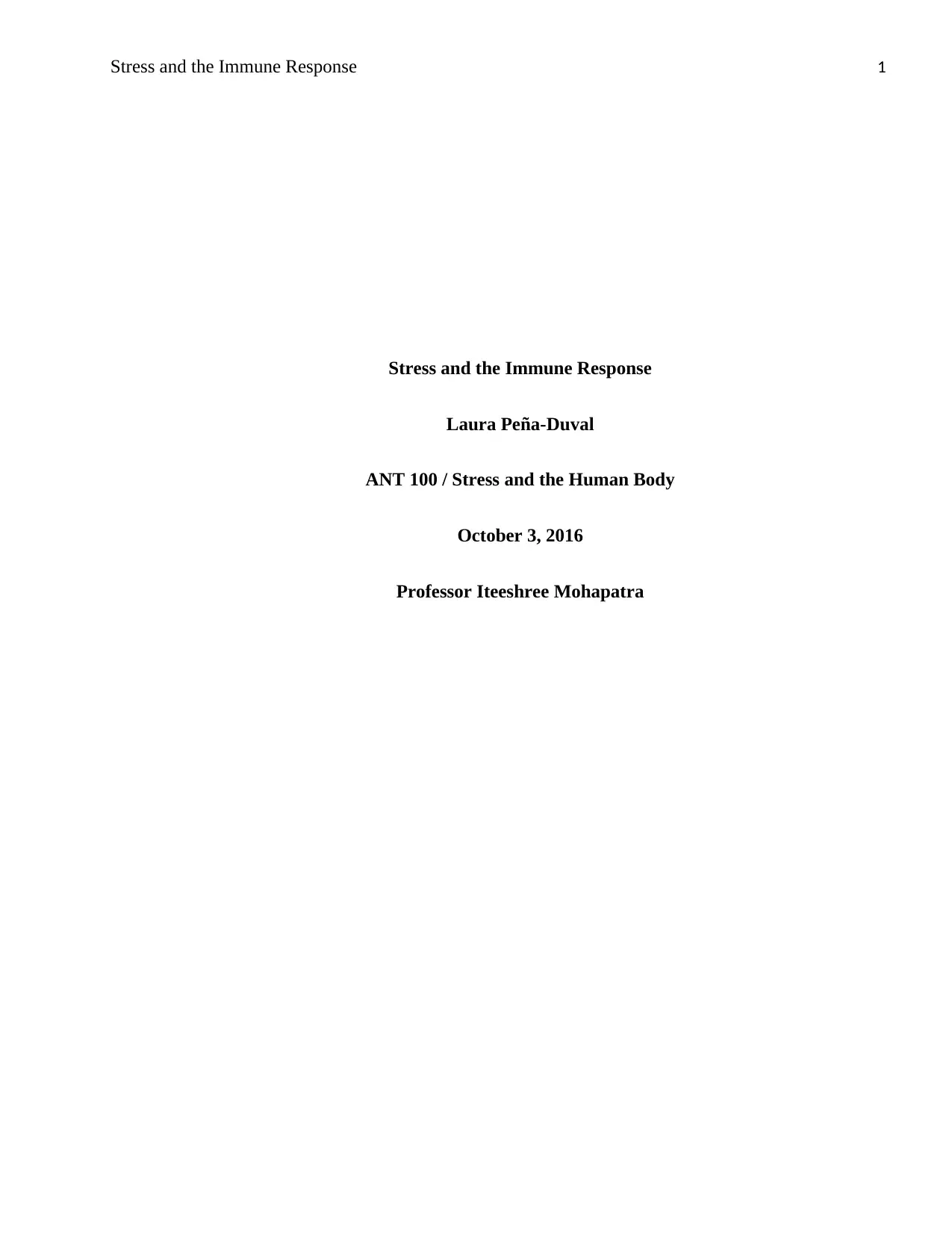
Stress and the Immune Response 1
Stress and the Immune Response
Laura Peña-Duval
ANT 100 / Stress and the Human Body
October 3, 2016
Professor Iteeshree Mohapatra
Stress and the Immune Response
Laura Peña-Duval
ANT 100 / Stress and the Human Body
October 3, 2016
Professor Iteeshree Mohapatra
Paraphrase This Document
Need a fresh take? Get an instant paraphrase of this document with our AI Paraphraser
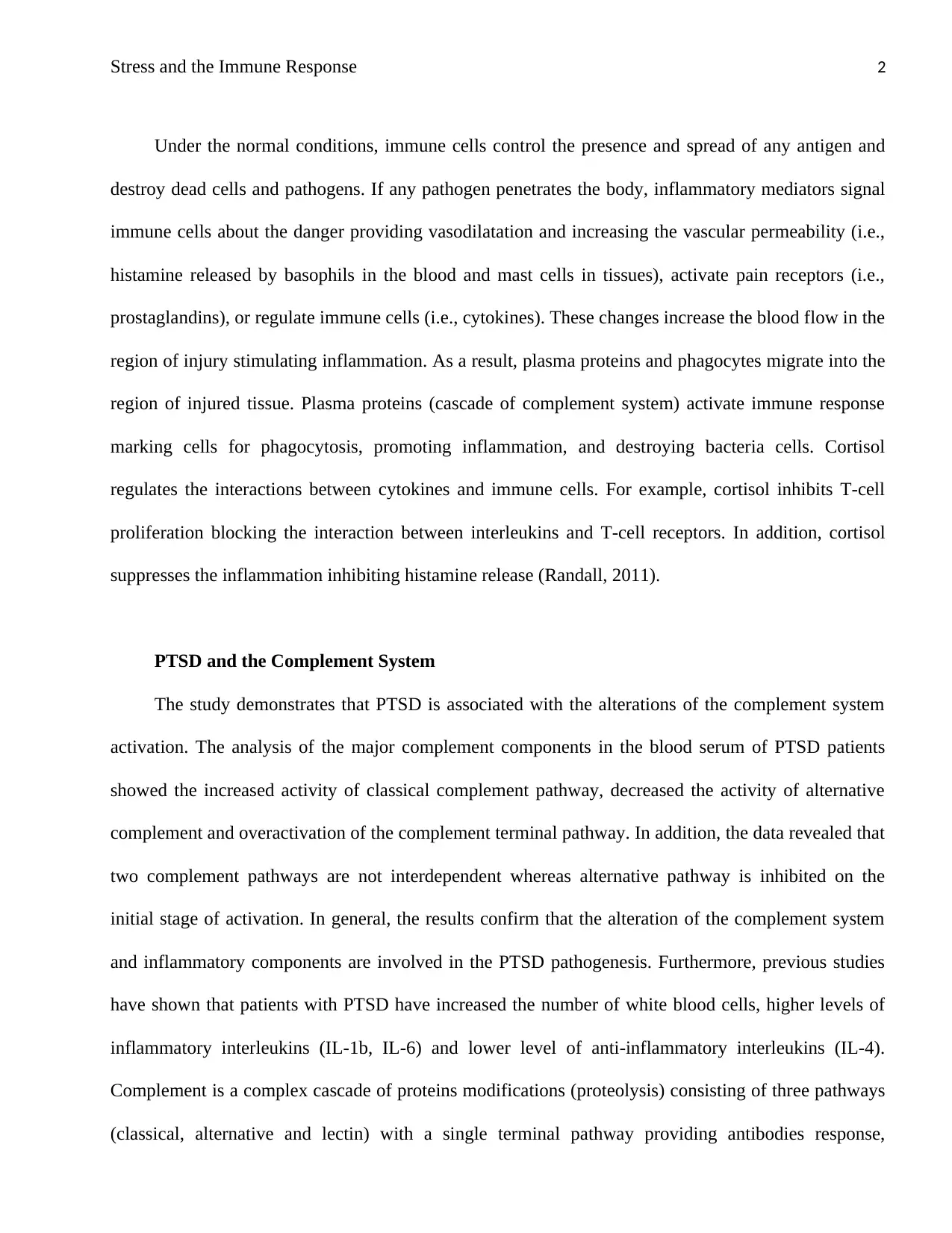
Stress and the Immune Response 2
Under the normal conditions, immune cells control the presence and spread of any antigen and
destroy dead cells and pathogens. If any pathogen penetrates the body, inflammatory mediators signal
immune cells about the danger providing vasodilatation and increasing the vascular permeability (i.e.,
histamine released by basophils in the blood and mast cells in tissues), activate pain receptors (i.e.,
prostaglandins), or regulate immune cells (i.e., cytokines). These changes increase the blood flow in the
region of injury stimulating inflammation. As a result, plasma proteins and phagocytes migrate into the
region of injured tissue. Plasma proteins (cascade of complement system) activate immune response
marking cells for phagocytosis, promoting inflammation, and destroying bacteria cells. Cortisol
regulates the interactions between cytokines and immune cells. For example, cortisol inhibits T-cell
proliferation blocking the interaction between interleukins and T-cell receptors. In addition, cortisol
suppresses the inflammation inhibiting histamine release (Randall, 2011).
PTSD and the Complement System
The study demonstrates that PTSD is associated with the alterations of the complement system
activation. The analysis of the major complement components in the blood serum of PTSD patients
showed the increased activity of classical complement pathway, decreased the activity of alternative
complement and overactivation of the complement terminal pathway. In addition, the data revealed that
two complement pathways are not interdependent whereas alternative pathway is inhibited on the
initial stage of activation. In general, the results confirm that the alteration of the complement system
and inflammatory components are involved in the PTSD pathogenesis. Furthermore, previous studies
have shown that patients with PTSD have increased the number of white blood cells, higher levels of
inflammatory interleukins (IL-1b, IL-6) and lower level of anti-inflammatory interleukins (IL-4).
Complement is a complex cascade of proteins modifications (proteolysis) consisting of three pathways
(classical, alternative and lectin) with a single terminal pathway providing antibodies response,
Under the normal conditions, immune cells control the presence and spread of any antigen and
destroy dead cells and pathogens. If any pathogen penetrates the body, inflammatory mediators signal
immune cells about the danger providing vasodilatation and increasing the vascular permeability (i.e.,
histamine released by basophils in the blood and mast cells in tissues), activate pain receptors (i.e.,
prostaglandins), or regulate immune cells (i.e., cytokines). These changes increase the blood flow in the
region of injury stimulating inflammation. As a result, plasma proteins and phagocytes migrate into the
region of injured tissue. Plasma proteins (cascade of complement system) activate immune response
marking cells for phagocytosis, promoting inflammation, and destroying bacteria cells. Cortisol
regulates the interactions between cytokines and immune cells. For example, cortisol inhibits T-cell
proliferation blocking the interaction between interleukins and T-cell receptors. In addition, cortisol
suppresses the inflammation inhibiting histamine release (Randall, 2011).
PTSD and the Complement System
The study demonstrates that PTSD is associated with the alterations of the complement system
activation. The analysis of the major complement components in the blood serum of PTSD patients
showed the increased activity of classical complement pathway, decreased the activity of alternative
complement and overactivation of the complement terminal pathway. In addition, the data revealed that
two complement pathways are not interdependent whereas alternative pathway is inhibited on the
initial stage of activation. In general, the results confirm that the alteration of the complement system
and inflammatory components are involved in the PTSD pathogenesis. Furthermore, previous studies
have shown that patients with PTSD have increased the number of white blood cells, higher levels of
inflammatory interleukins (IL-1b, IL-6) and lower level of anti-inflammatory interleukins (IL-4).
Complement is a complex cascade of proteins modifications (proteolysis) consisting of three pathways
(classical, alternative and lectin) with a single terminal pathway providing antibodies response,
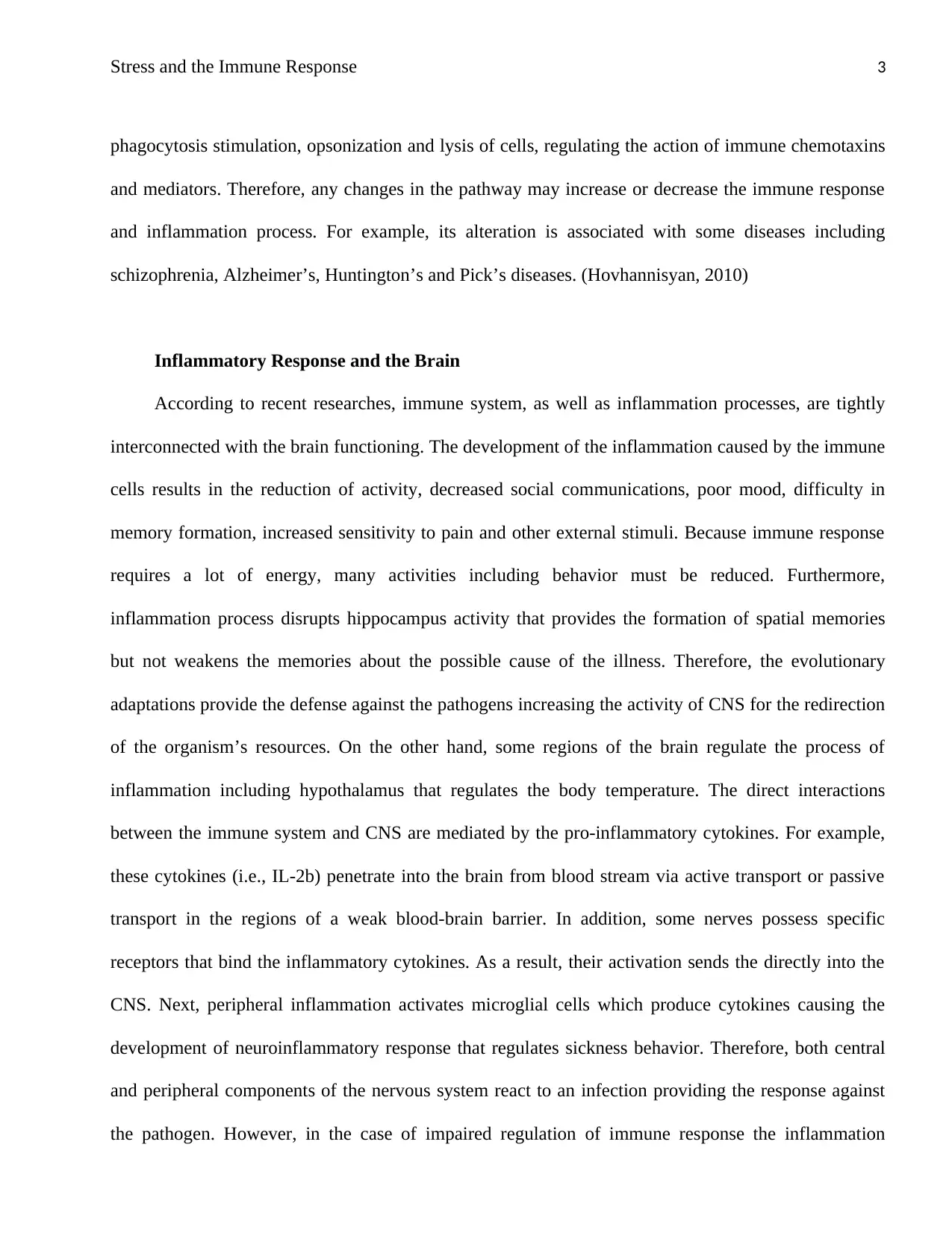
Stress and the Immune Response 3
phagocytosis stimulation, opsonization and lysis of cells, regulating the action of immune chemotaxins
and mediators. Therefore, any changes in the pathway may increase or decrease the immune response
and inflammation process. For example, its alteration is associated with some diseases including
schizophrenia, Alzheimer’s, Huntington’s and Pick’s diseases. (Hovhannisyan, 2010)
Inflammatory Response and the Brain
According to recent researches, immune system, as well as inflammation processes, are tightly
interconnected with the brain functioning. The development of the inflammation caused by the immune
cells results in the reduction of activity, decreased social communications, poor mood, difficulty in
memory formation, increased sensitivity to pain and other external stimuli. Because immune response
requires a lot of energy, many activities including behavior must be reduced. Furthermore,
inflammation process disrupts hippocampus activity that provides the formation of spatial memories
but not weakens the memories about the possible cause of the illness. Therefore, the evolutionary
adaptations provide the defense against the pathogens increasing the activity of CNS for the redirection
of the organism’s resources. On the other hand, some regions of the brain regulate the process of
inflammation including hypothalamus that regulates the body temperature. The direct interactions
between the immune system and CNS are mediated by the pro-inflammatory cytokines. For example,
these cytokines (i.e., IL-2b) penetrate into the brain from blood stream via active transport or passive
transport in the regions of a weak blood-brain barrier. In addition, some nerves possess specific
receptors that bind the inflammatory cytokines. As a result, their activation sends the directly into the
CNS. Next, peripheral inflammation activates microglial cells which produce cytokines causing the
development of neuroinflammatory response that regulates sickness behavior. Therefore, both central
and peripheral components of the nervous system react to an infection providing the response against
the pathogen. However, in the case of impaired regulation of immune response the inflammation
phagocytosis stimulation, opsonization and lysis of cells, regulating the action of immune chemotaxins
and mediators. Therefore, any changes in the pathway may increase or decrease the immune response
and inflammation process. For example, its alteration is associated with some diseases including
schizophrenia, Alzheimer’s, Huntington’s and Pick’s diseases. (Hovhannisyan, 2010)
Inflammatory Response and the Brain
According to recent researches, immune system, as well as inflammation processes, are tightly
interconnected with the brain functioning. The development of the inflammation caused by the immune
cells results in the reduction of activity, decreased social communications, poor mood, difficulty in
memory formation, increased sensitivity to pain and other external stimuli. Because immune response
requires a lot of energy, many activities including behavior must be reduced. Furthermore,
inflammation process disrupts hippocampus activity that provides the formation of spatial memories
but not weakens the memories about the possible cause of the illness. Therefore, the evolutionary
adaptations provide the defense against the pathogens increasing the activity of CNS for the redirection
of the organism’s resources. On the other hand, some regions of the brain regulate the process of
inflammation including hypothalamus that regulates the body temperature. The direct interactions
between the immune system and CNS are mediated by the pro-inflammatory cytokines. For example,
these cytokines (i.e., IL-2b) penetrate into the brain from blood stream via active transport or passive
transport in the regions of a weak blood-brain barrier. In addition, some nerves possess specific
receptors that bind the inflammatory cytokines. As a result, their activation sends the directly into the
CNS. Next, peripheral inflammation activates microglial cells which produce cytokines causing the
development of neuroinflammatory response that regulates sickness behavior. Therefore, both central
and peripheral components of the nervous system react to an infection providing the response against
the pathogen. However, in the case of impaired regulation of immune response the inflammation
⊘ This is a preview!⊘
Do you want full access?
Subscribe today to unlock all pages.

Trusted by 1+ million students worldwide
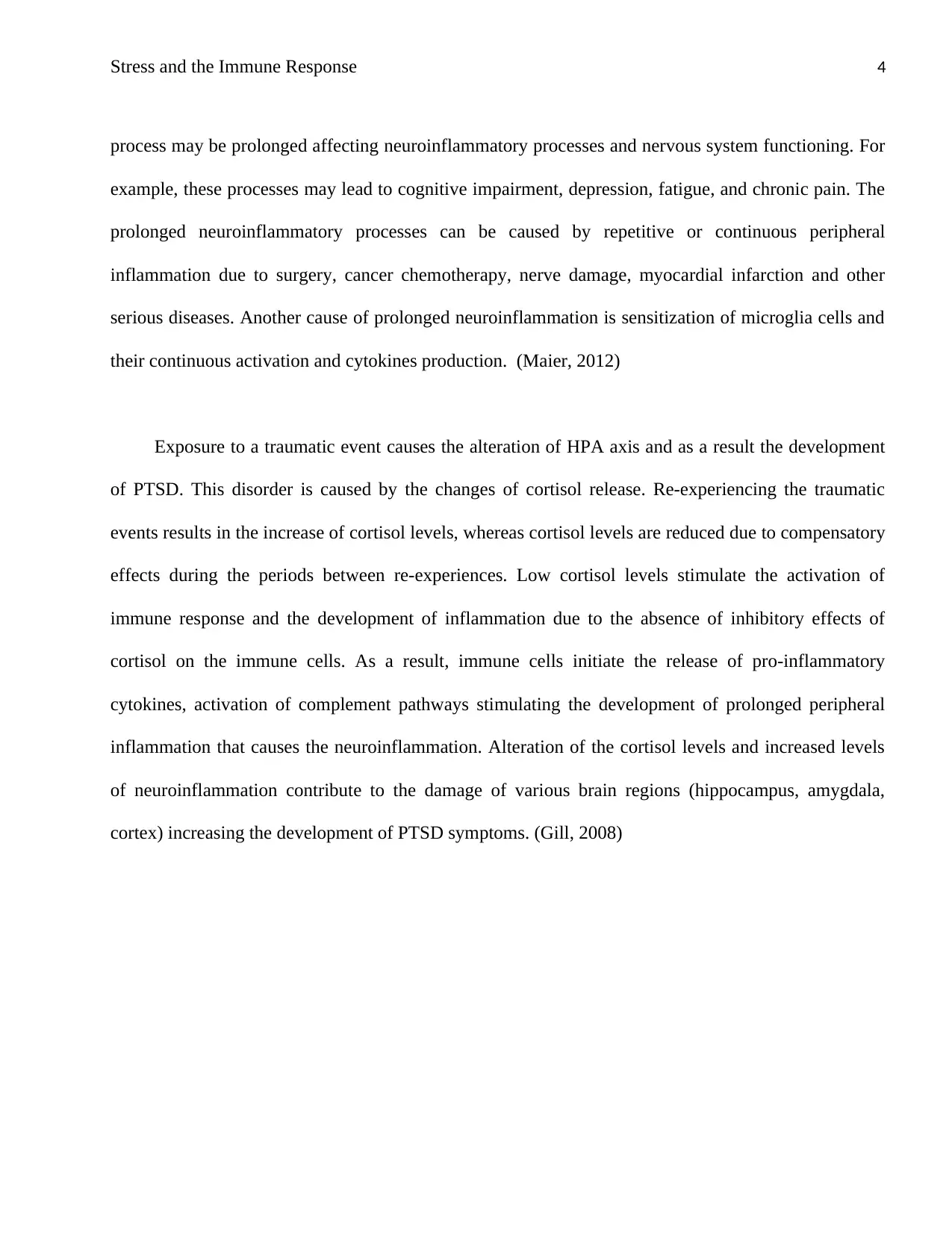
Stress and the Immune Response 4
process may be prolonged affecting neuroinflammatory processes and nervous system functioning. For
example, these processes may lead to cognitive impairment, depression, fatigue, and chronic pain. The
prolonged neuroinflammatory processes can be caused by repetitive or continuous peripheral
inflammation due to surgery, cancer chemotherapy, nerve damage, myocardial infarction and other
serious diseases. Another cause of prolonged neuroinflammation is sensitization of microglia cells and
their continuous activation and cytokines production. (Maier, 2012)
Exposure to a traumatic event causes the alteration of HPA axis and as a result the development
of PTSD. This disorder is caused by the changes of cortisol release. Re-experiencing the traumatic
events results in the increase of cortisol levels, whereas cortisol levels are reduced due to compensatory
effects during the periods between re-experiences. Low cortisol levels stimulate the activation of
immune response and the development of inflammation due to the absence of inhibitory effects of
cortisol on the immune cells. As a result, immune cells initiate the release of pro-inflammatory
cytokines, activation of complement pathways stimulating the development of prolonged peripheral
inflammation that causes the neuroinflammation. Alteration of the cortisol levels and increased levels
of neuroinflammation contribute to the damage of various brain regions (hippocampus, amygdala,
cortex) increasing the development of PTSD symptoms. (Gill, 2008)
process may be prolonged affecting neuroinflammatory processes and nervous system functioning. For
example, these processes may lead to cognitive impairment, depression, fatigue, and chronic pain. The
prolonged neuroinflammatory processes can be caused by repetitive or continuous peripheral
inflammation due to surgery, cancer chemotherapy, nerve damage, myocardial infarction and other
serious diseases. Another cause of prolonged neuroinflammation is sensitization of microglia cells and
their continuous activation and cytokines production. (Maier, 2012)
Exposure to a traumatic event causes the alteration of HPA axis and as a result the development
of PTSD. This disorder is caused by the changes of cortisol release. Re-experiencing the traumatic
events results in the increase of cortisol levels, whereas cortisol levels are reduced due to compensatory
effects during the periods between re-experiences. Low cortisol levels stimulate the activation of
immune response and the development of inflammation due to the absence of inhibitory effects of
cortisol on the immune cells. As a result, immune cells initiate the release of pro-inflammatory
cytokines, activation of complement pathways stimulating the development of prolonged peripheral
inflammation that causes the neuroinflammation. Alteration of the cortisol levels and increased levels
of neuroinflammation contribute to the damage of various brain regions (hippocampus, amygdala,
cortex) increasing the development of PTSD symptoms. (Gill, 2008)
Paraphrase This Document
Need a fresh take? Get an instant paraphrase of this document with our AI Paraphraser
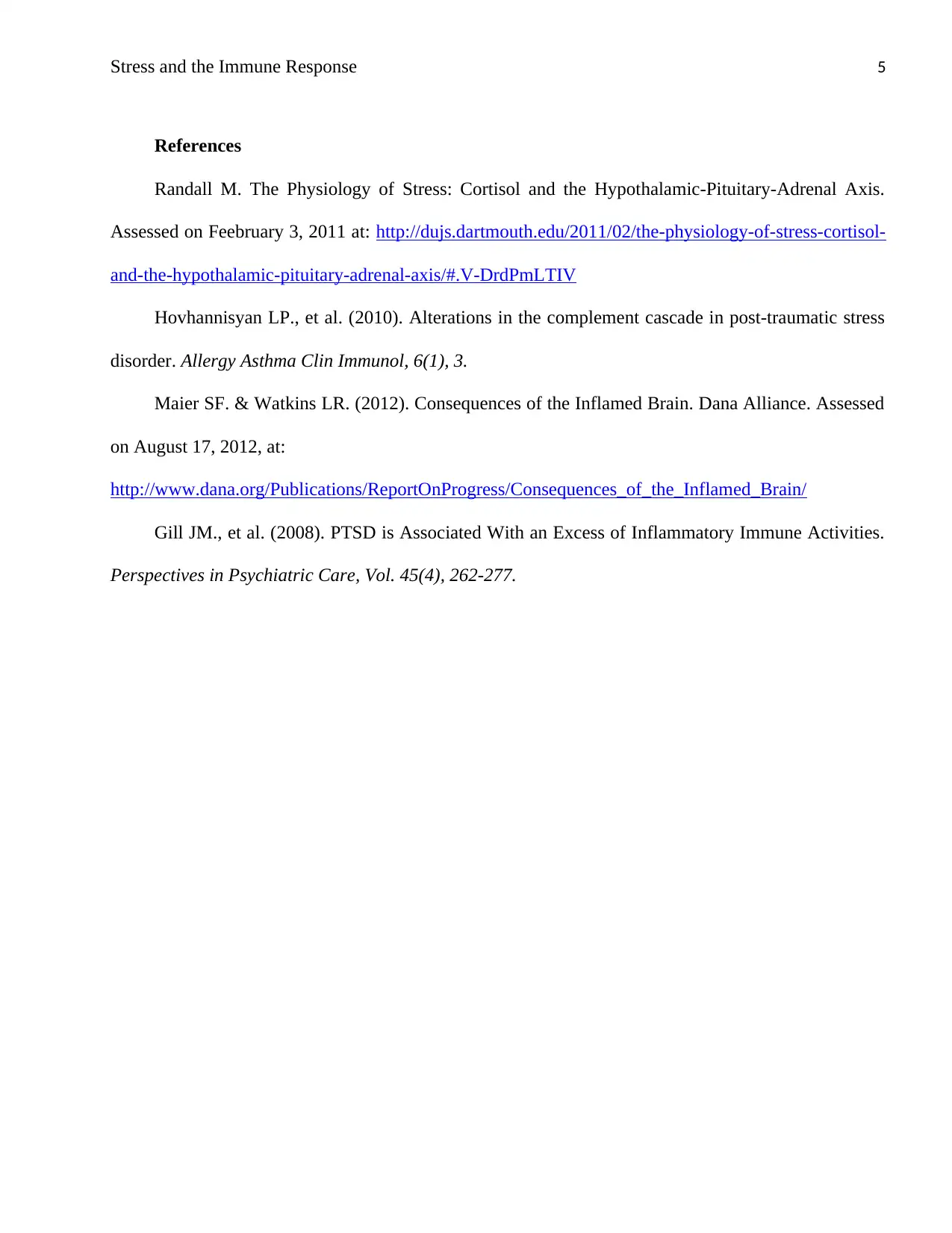
Stress and the Immune Response 5
References
Randall M. The Physiology of Stress: Cortisol and the Hypothalamic-Pituitary-Adrenal Axis.
Assessed on Feebruary 3, 2011 at: http://dujs.dartmouth.edu/2011/02/the-physiology-of-stress-cortisol-
and-the-hypothalamic-pituitary-adrenal-axis/#.V-DrdPmLTIV
Hovhannisyan LP., et al. (2010). Alterations in the complement cascade in post-traumatic stress
disorder. Allergy Asthma Clin Immunol, 6(1), 3.
Maier SF. & Watkins LR. (2012). Consequences of the Inflamed Brain. Dana Alliance. Assessed
on August 17, 2012, at:
http://www.dana.org/Publications/ReportOnProgress/Consequences_of_the_Inflamed_Brain/
Gill JM., et al. (2008). PTSD is Associated With an Excess of Inflammatory Immune Activities.
Perspectives in Psychiatric Care, Vol. 45(4), 262-277.
References
Randall M. The Physiology of Stress: Cortisol and the Hypothalamic-Pituitary-Adrenal Axis.
Assessed on Feebruary 3, 2011 at: http://dujs.dartmouth.edu/2011/02/the-physiology-of-stress-cortisol-
and-the-hypothalamic-pituitary-adrenal-axis/#.V-DrdPmLTIV
Hovhannisyan LP., et al. (2010). Alterations in the complement cascade in post-traumatic stress
disorder. Allergy Asthma Clin Immunol, 6(1), 3.
Maier SF. & Watkins LR. (2012). Consequences of the Inflamed Brain. Dana Alliance. Assessed
on August 17, 2012, at:
http://www.dana.org/Publications/ReportOnProgress/Consequences_of_the_Inflamed_Brain/
Gill JM., et al. (2008). PTSD is Associated With an Excess of Inflammatory Immune Activities.
Perspectives in Psychiatric Care, Vol. 45(4), 262-277.
1 out of 5
Related Documents
Your All-in-One AI-Powered Toolkit for Academic Success.
+13062052269
info@desklib.com
Available 24*7 on WhatsApp / Email
![[object Object]](/_next/static/media/star-bottom.7253800d.svg)
Unlock your academic potential
Copyright © 2020–2026 A2Z Services. All Rights Reserved. Developed and managed by ZUCOL.





